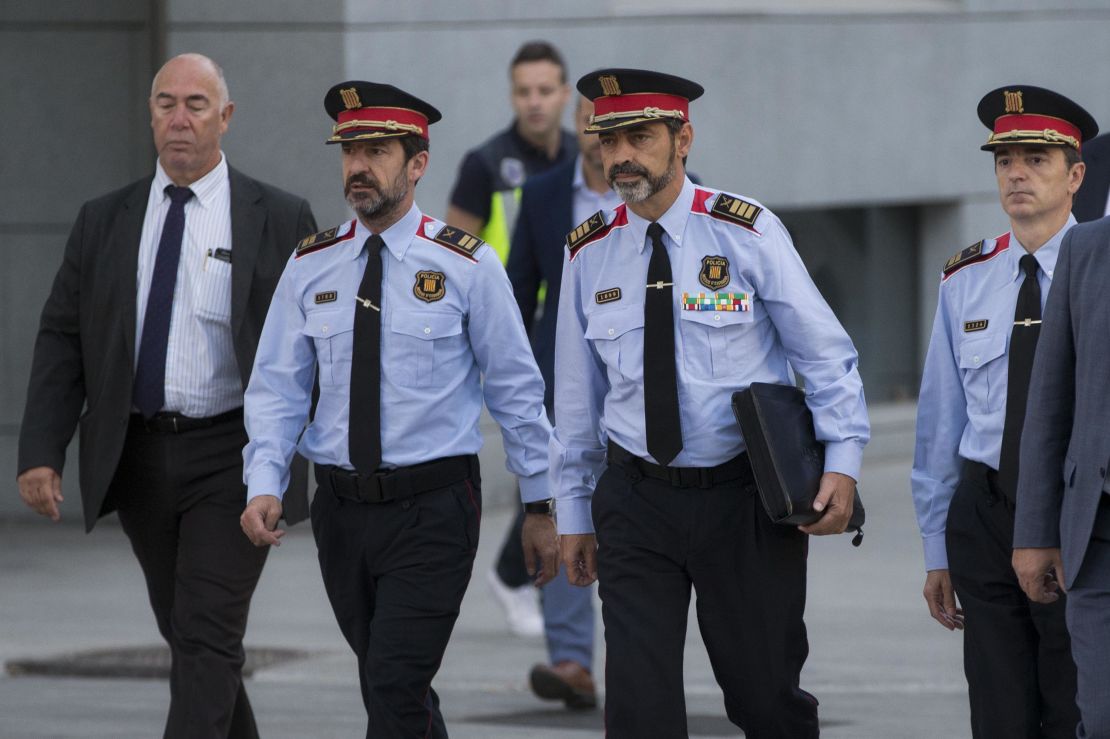The Catalan police chief appeared in a Madrid court Friday to answer allegations of sedition amid an ongoing deadlock after the banned independence referendum in Spain’s restive northeast region.
Josep Lluís Trapero appeared in the Spanish capital along with two leading figures in the Catalan independence movement. Spanish authorities believe Trapero’s 17,000-strong force, the Mossos d’Esquadra, didn’t do enough to prevent Sunday’s vote from taking place.
In Barcelona, Catalan authorities published official results from Sunday’s referendum, showing 90% voted in favor of independence and nearly 8% against, with about 2% of ballots left blank. The turnout was 43% – nearly 2.3 million people voting out of a possible 5.3 million.
A session of the Catalan parliament to disccuss the “current political situation” would be held on Tuesday, a parliament spokesman said. The Spanish Constitutional Court had banned a session of the Catalan parliament planned for Monday in an apparent attempt to prevent Catalan President Carles Puigdemont’s expected declaration of independence.

Trapero did not speak to reporters after he emerged from court. No immediate action was taken against him, but the sedition investigation continues.
Jordi Cuixart, head of separatist group Omnium Cultural, told reporters after his court appearance that he exercised his right not to answer the judges. “I don’t recognize the authority of this court over this,” he said.
He criticized the Spanish state for attempting to solve a political issue through the courts. “We are convinced that, sooner rather than later, the Spanish state will have to accept dialogue,” he said.
Sánchez, president of the Catalan National Assembly, told reporters he had denied the sedition allegations in front of the judge. “We are convinced that we didn’t commit any kind of crime. I only declared in my defense to make clear the legitimacy of a peaceful, nonviolent demonstration.”
The sedition inquiry relates to violent protests on September 21 and 22 in the buildup to the October 1 vote.
Fresh elections call
Speaking after a meeting of Catalan political party leaders in Barcelona, Carlos Carrizosa, a spokesman for the anti-independence Ciudadanos party, urged Spanish Prime Minister Mariano Rajoy to use Article 155 of the Spanish constitution – which allows Madrid to impose direct rule on a region if it acts outside the law – to call for new elections.
“Rajoy cannot allow the independence of Catalonia to be proclaimed on Tuesday, when he has an institutional instrument to prevent it,” Carrizosa said.
Such a step would be seen as a last resort as it would almost certainly require officers from the Guardia Civil, the national security force, to be deployed again on the streets of Catalonia.
Madrid’s representative to Catalonia apologized Friday for the violence which occurred during the vote.
In the first note of contrition by a Spanish government representative, Millo told broadcaster Catalan TV3: “I insist, I’m really sorry, I want to apologize because I wouldn’t wish anything like that to happen to any person, the fact that people got hit and required assistance.”
Only one of the 2.2 million people who voted remains in hospital, he noted.
Millo added that there was only trouble in 13 of the 2,315 polling stations that opened in defiance of a ban. “In those 13 polling stations there were human barriers that surrounded the policemen who were unable to leave,” he said.
Madrid considers next move
The Catalonia crisis is likely to be the main topic of discussion Friday at the weekly meeting of the Spanish Cabinet.
It’s not yet clear what course of action the Spanish government will take if the Catalan government goes ahead with a declaration of independence.
“I will do what’s best for Spain and when I think it’s the right time,” Prime Minister Mariano Rajoy told Spanish news agency Efe on Thursday. “I will listen to all the positions, but the final decision will be mine.”
Asked Thursday whether the parliamentary session planned for Monday would take place, Puigdemont said: “That is for Parliament to decide. But the Constitutional Court has no right to impede a democratic parliament session, which by law is inviolable.”
Puigdemont was expected to meet with an “independent commission for mediation and dialogue” on Friday evening.
Catalonia vs. Spain: Here’s what could happen next
Divided region
The referendum has exposed deep divisions in Catalonia. Rallies both for and against independence are planned for the weekend.
In an indication of the uncertainty gripping the region, Banco Sabadell, one of Catalonia’s largest banks, announced Thursday that it would move its registered headquarters outside the Catalonia region to the eastern city of Alicante.
There are concerns that other businesses could follow suit, threatening stability in Spain’s most economically productive region.
CNN’s Vasco Cotovio and Claudia Rebaza reported from Barcelona, while Laura Smith-Spark wrote from London. CNN’s Lorenzo D’Agostino contributed to this report.








